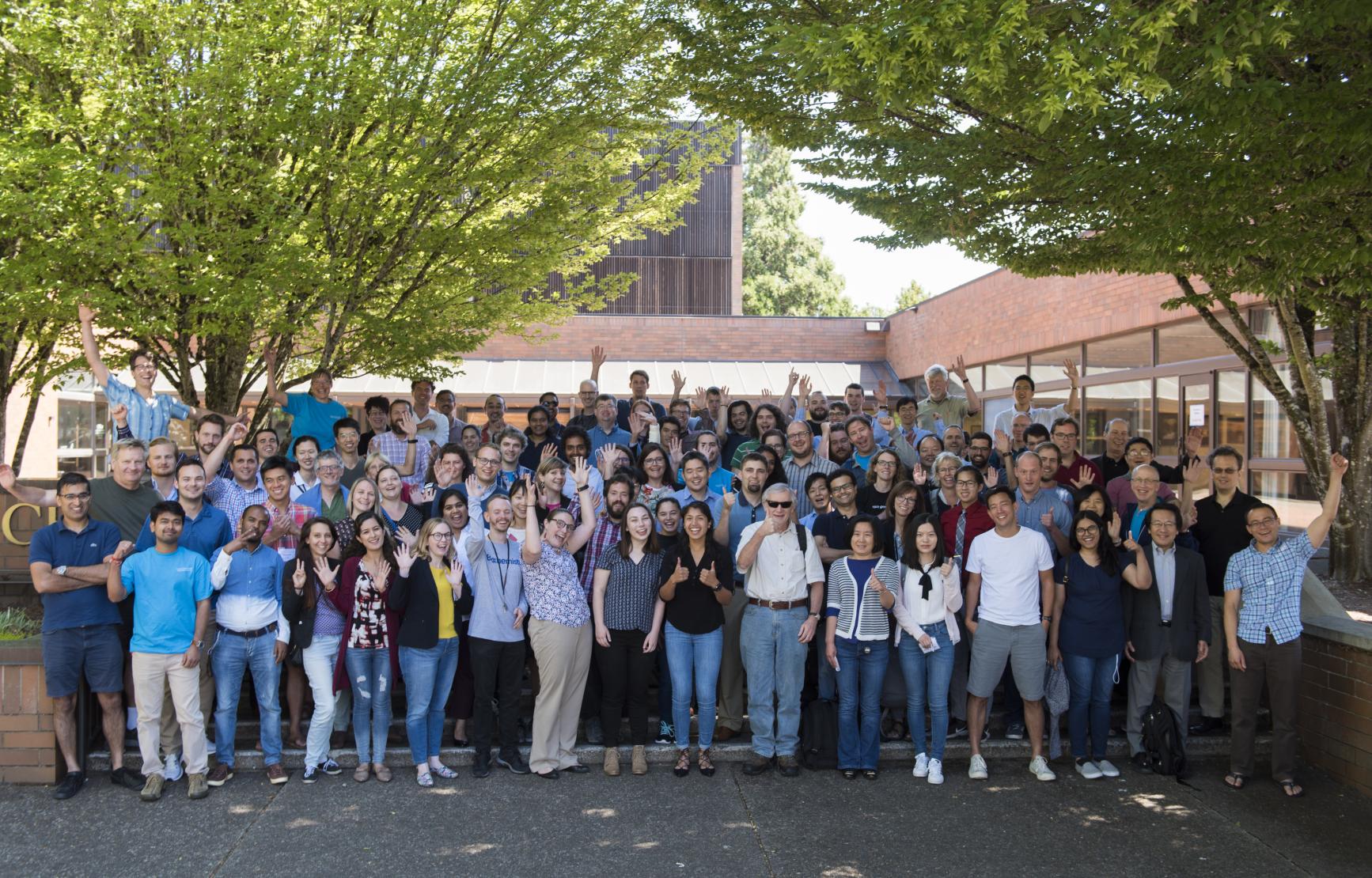The International GCE Webinar is a monthly webinar series, open to all, featuring talks on cutting-edge applications of genetic code expansion (GCE) technologies as well as advances in the GCE field. It is organized by the Oregon State University GCE4All Research Center and hosted by Rick Cooley and John Lueck. The webinar is meant to be of value to both developers and users of GCE, as well as anyone interested in learning more about it. Speakers will be from around the globe, and we invite speaker and topic suggestions.
International GCE Webinar

Webinar mechanics
The webinars run from October through June and occur on the third Thursday of each month at 10 a.m. Eastern Time (corresponding to 2 p.m. GMT March-October and 3 p.m. GMT November through February). The general format is to give each of the two speakers ~25 minutes which we recommend be divided into a presentation of ~20 minutes followed by ~5 minutes of discussion.
Registration
When possible, seminars will be recorded and made available for viewing on the GCE4All YouTube Channel; as this will not be possible for all seminars, please make it a priority to register for and participate in the live events. Although the seminars are free and open to all, pre-registration is required to get the specific link for each seminar.
Register here
Check out our YouTube Channel
Upcoming Webinars
June 20th, 2024
Studying structural and functional consequences of site-specific phosphorylation in Ubiquitin and NEDD8 by using unnatural amino acids
Katrin Stuber (University of Copenhagen, Denmark)
Post-translational modifications (PTMs) of ubiquitin (Ub) and Ub-like proteins like NEDD8 have become more and more the focus of attention in recent years, since they add a new layer of complexity to the ubiquitin code. In our work we established and optimized the genetic code expansion method for the incorporation of phosphoserine (pSer) and its non-hydrolyzable analog (nhpSer) into Ub and NEDD8. This allowed us to study the influence of this site-specific phosphorylation on structure, function and interactome. Furthermore, we could showcase the use of nhpSer as a superior phosphomimic compared to the widely used phosphomimic amino acids aspartate and glutamate.
Investigating site-specific acetylation of ubiquitin and the suitability of surrogates for acetylation by genetic code expansion
Simon Kienle (University of Konstanz, Germany)
Covalent attachment of ubiquitin (Ub) to proteins is a highly versatile posttranslational modification. Moreover, Ub is not only a modifier but itself is modified by e.g. phosphorylation and lysine acetylation. However, the functional consequences of Ub acetylation are poorly understood. In this work we comprehensive characterized all seven possible mono-acetylated Ub variants on a biochemical, structural and interactome level. This study also allowed us to assess the suitability of acetylation surrogates in their ability to mimic all aspects of lysine acetylation.
2023-2024 Webinar Recordings
October 19th, 2023
Expanding the non-canonical amino acid toolbox for mammalian cells
Simon Elsässer (Karolinska Institutet, Sweden)
November 16th, 2023
The cX-Zyme: A Halogen Bond Catalyzed DNA Nuclease
P. Shing Ho (Colorado State University, USA)
January 18th, 2024
Engineering post-translationally modified selenoproteins in E. coli
Natalie Krahn (University of Georgia, USA)
Chemically expanded antibody engineering on the yeast surface: covalent antibodies and more
Jim van Deventer (Tuffs University, USA)
February 15th, 2024
Applications of Genetic Code Expansion and Bioorthogonal Chemistry to Study Membrane Proteins
Tom Sakmar (The Rockefeller University, USA)
Novel molecular insights into the Orai1 channel dynamics using photocrosslinking
Isabella Derler (University Linz, Austria)
March 21th, 2024
Genetically Encoded Bioorthogonal Chemistry in Living Systems
Peng Chen (Peking University, China)
April 18th, 2024
Non-canonical amino acids as building blocks for recombinant proteins and peptides
Birgit Wiltschi (University Vienna, Austria)
A mammalian cell-based directed evolution platform to enhance the efficiency of ncAA incorporation systems
Abhishek Chatterjee (Boston University, USA)
May 16th, 2024
Minimal invasive labeling of HIV using genetic code expansion and click chemistry
Barbara Mueller (University of Heidelberg, Germany)
Protein editing beyond alpha-amino acids
Alanna Schepartz (UC Berkeley, USA)
2022-2023 Webinar Recordings
October 20th, 2022
PermaPhos: Revealing New Functions of Phosphorylated Proteins
Rick Cooley (Oregon State University)
November 17th, 2022
Genetically encoded chemical tools for protein studies in the live cell
Irene Coin (Leipzig)
Design and Evolution of Enzymes with Non-Canonical Catalytic Mechanisms
Anthony Green (Manchester, UK)
December 15th, 2022
Investigations of multi-domain DNA/RNA binding protein machines using FEncAA
Edwin Antony (Saint Louis University, School of Medicine)
Decoding the Language of Aromatic Side-Chains in Ion Channels and Receptors
Chris Ahern (University of Iowa)
January 19th, 2023
Methodological challenges of an expanded genetic code
Nediljko Budisa (University of Manitoba, Canada)
February 16th, 2023
Engineering Biomaterials Bearing Non-Canonical Amino Acids
Jin Kim Montclare (New York University)
Expanded genetic code for live-cell fluorescent protein labeling in (neuro)biology
Ivana Nikic-Spiegel (Tuebingen)
March 16th, 2023
Identification of neuropeptide and toxin binding sites on a membrane-embedded receptor through crosslinking
Stephan Pless (University of Copenhagen)
April 20th, 2023
Split aminoacyl-tRNA synthetases for proximity-induced stop codon suppression
Jeffery M. Tharp (Indiana University School of Medicine)
May 18th, 2023
Protein chemistry: an unnatural approach to unravelling the mystery of allostery
Sharona Gordon (University of Washington)
Applications of the Fluorescent Amino Acid Acridonylalanine
James Petersson (University of Pennsylvania)
June 15th, 2023
NMR isotope-labelled, serine-16 phosphorylated, amelogenin – the key to brighter smiles and understanding biomineralization (Recording)
Garry Buchko (PNNL)
GCE Community Networking
A resource available for more extensive discussion and networking among those learning about, using and/or developing GCE technologies is the GCE bulletin board – GCEbb – a forum for email-based discussions. More information about the GCEbb, including how to join the email list, can be found at the GCEbb home page. We are looking forward to having you join our GCE conversations!